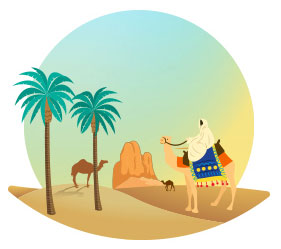Baha’uddin Walad
Baha’uddin Walad (1): “Sultan Al-‘Ulama” (Sultan of the Scholars) Sheikh Baha’uddin Muhammad Bin Al-Husayn Bin Ahmed Bin Mahmoud Bin Mawdud Al-Khwarizmi Al-Herawi was a resident of Konya known as the Sultan of Scholars. There is a narration that says that the Messenger of Allah, may Allah’s peace and blessings be upon him and his family, was the person who gave him the title of Sultan Al-‘Ulama in a dream that all the scholars of Balkh had on the same night.
Baha’uddin Walad was a pious Sufi and the father of Maulana Jalaluddin Al-Rumi. He belonged to the Kubrawiya school (2), and his lineage is connected to that of Sayyiduna Abu Bakr Al-Siddiq, may Allah be pleased with him.
Baha’uddin was born in Balkh in present-day Afghanistan in either 542 AH (1148 AD) or 545 AH. He studied hadith, tafsir (exegesis of the Qur’an), grammar, and other branches of knowledge considered essential at his time. When he became qualified to teach, he acquired a teaching ijaza from Jama’at Kibar Al-‘Ulama as was the norm in Balkh. People flocked to him to receive knowledge and study with him. A few years later, he began his Sufi activities, dividing his teaching time between lessons on the inner and outer dimensions of Qur’an interpretation, preaching, and giving sermons. He would typically teach from early morning until Dhuhr time, after which he would provide students with knowledge of Tasawwuf, sign interpretation, and the esoteric at the time of ‘Asr Prayer. He also used to preach and give the Friday sermons in the mosques.
Among Baha’uddin’s strengths was that he did not restrict himself to a specific branch of knowledge. Rather, he was knowledgeable in all possible domains. He also used to issue fatwas (religious edicts) regarding complicated issues, guiding the judges of his time to the correct means of solving the issues put before them. He did not ask for money for any of his fatwas. As a teacher, he gave educational lessons that prominent intellectuals used to attend, and these lessons were open to anyone who wished to join. After he would finish teaching, giving fatwas, and solving people’s problems for the day, he would then go at night to his monastery to spend time in remembrance of Allah, occupying himself with the supplications that he was accustomed to repeating every night.
Something that distinguished Baha’uddin Walad from the scholars of his time was his great sense of humility and modesty—to the point that he even used to hide his scholarly works, saying: My work should not ever be published; I am not qualified for that. I know myself very well, and I am not qualified to write and compile.
This is why Baha’uddin’s scholarly work, Al-Ma’arif, was not published until after his death. Rather, it was assembled and organized by his students, who feared it would be lost and wanted to ensure that others would have the opportunity to benefit from it.
It was well known that Baha’uddin Walad used to oppose the ideas of philosophers and follow the opinions of Sheikh Ahmed Al-Ghazali (d. 520 AH / 1126 AD) regarding the need to challenge philosophers and work to erase their influence.
Sultan Al-‘Ulama, Baha’uddin Walad, wished to leave Balkh and settle in a place in which he would be able to spread his Sufi teachings and his social opinions without facing any obstacles. He was also fearful regarding what he had heard about the tyranny of the Mongols and the transgressions and atrocities they had committed. For these reasons, he left his country permanently, departing from Balkh with his entire family in either 616 or 617 AH (1218 or 1219 AD). On his way, he passed through Khorasan and went to Nishapur and then Baghdad, staying there for a short while before heading to the Hejaz to perform the obligatory Hajj pilgrimage. He then set out for the Levant, specifically Damascus and Aleppo. After that, he went to Anatolia, staying there for some time in Laranda, which is now known as Karaman (3) and is where the mother of Maulana Jalaluddin Al-Rumi passed away. A small mosque was constructed in her honor in the area where she died. In Laranda, Maulana Jalaluddin married Gowhar Khatun, a young woman from Samarqand who bore him a son named Sultan Walad in Laranda in 623 AH (1226 AD).
Baha’uddin Walad and his family eventually headed to Konya, Turkey, where he finally settled. It was in Konya that Baha’uddin Walad began his work of preaching and teaching, achieving great success with these activities. Only two years later, however, he died on the 18th of Rabi’ Al-Thani in either 628 AH (1231 AD) or 618 AH (1221 AD) – although 628 is more likely.
Baha’uddin’s authored works include: Al-Asrar Al-Ruhiya, Mashraq Al-Shamsayn fi Al-Tasawwuf wa Al-Akhlaq, and Al-Ma’arif Al-Walda fi Asrar Al-Ahda, which was written in Persian.
Source: Kitab Al-Sulala Al-Bakria As-Siddiqia – Part II, by Ahmed Farghal Al-De’abassi Al-Bakri
Date of Publication
1 Ramadan 1438 AH / May 26, 2017 AD
(1) Hidayat-ul-Arifeen 2/ 110, Mu’jam Al-Mu’allifin 9/ 233, Idah Al-Maknun 4/ 487, Al-Mathnawi 1/ 8-12, Jalaluddin Al-Rumi Bain Al-Sufia wa ‘Ulama’ Al-Kalam pp. 63-69, Al-Shams Al-Muntasira pp. 51-56
(2) Kubrawiya: Referring to Sheikh Najm Al-Din Kubra, who was known as “Vali Tarash,” meaning “manufacturer of saints,” due to the many disciples of his who excelled and became prominent sheikhs. There is a striking similarity between Baha’uddin Walad’s Al-Ma’arif and the books of Najm Al-Din Kubra, providing solid evidence that he was among his prominent disciples. See: Al-Mathnawi 1/ 8
(3) Karaman used to be the capital of the Sultanate of Rum. See: Al-Mathnawi 1/ 11
